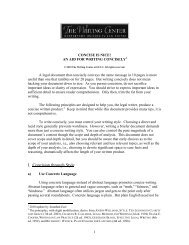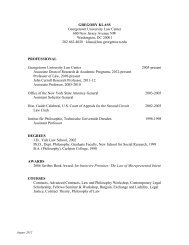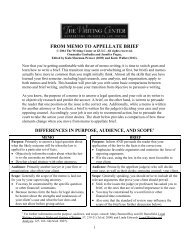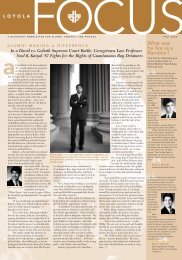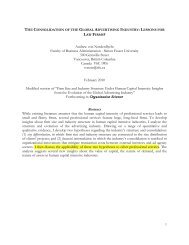Date: April 12, 2013 Topic: The Shrinking ... - Georgetown Law
Date: April 12, 2013 Topic: The Shrinking ... - Georgetown Law
Date: April 12, 2013 Topic: The Shrinking ... - Georgetown Law
You also want an ePaper? Increase the reach of your titles
YUMPU automatically turns print PDFs into web optimized ePapers that Google loves.
General Counsel with Power? 2011 <br />
Legal Budget Control <br />
<strong>The</strong> shape of the legal function gives some, but not full, insight into how the general counsel controls <br />
the legal budget. <strong>The</strong>re is much variation, first in how much budgetary information the headquarter <br />
legal function holds, second with respect to the system of accounting for legal fees, and third in what <br />
levers are used to keep legal expenses under control. <br />
First, in terms of information, some multi-‐divisional firms hold information about legal spending of all <br />
divisions centrally, whilst others admit to not having a fully functioning central record keeping to date of <br />
the total corporate legal spending, including spending by autonomous business units. Many <br />
respondents mentioned that they have recently implemented, or are in the process of implementing, an <br />
e-‐billing system which, amongst other things, would enhance the transparency and accuracy of legal <br />
spending. <br />
Second, in terms of accounting for legal fees, one approach at one extreme is a tightly controlled central <br />
legal budget, with a specific lawyer as a clear budget holder for each line of legal activity. At the other <br />
extreme, another approach is to have no central legal budget at all, by embedding all legal fees in <br />
business project costs. Many firms fall in-‐between, with a central legal budget which lawyers control <br />
directly (e.g. for major litigation or corporate transaction), and project-‐based budgets in civil engineering, <br />
for example, in which legal fees for contract drafting and negotiation are included. <br />
Third, many respondents have an explicit policy to use in-‐house resources first before going out-‐of-house,<br />
as it is generally considered cheaper to do so. However, only a small number of general counsel <br />
interviewed rely on explicit mechanisms for cost control. In one case, the general counsel of a <br />
divisionalized company stated that ‘our legal department is a planned economy’, pointing to a <br />
performance ‘dashboard’ that the legal department at each operating business unit was required to <br />
submit on a monthly basis. At another company, the general counsel introduced a central approval <br />
system for legal fees above a certain sum. This led in-‐house lawyers to think twice about the necessity <br />
of putting work out to external lawyers. <br />
Externalizers and Internalizers <br />
Despite entertaining a common aim to contain legal costs, the interviews reveal an enormous variation <br />
in how corporate legal departments are attempting to fulfil this objective. One comparative indicator is <br />
the percentage of total legal spending on external lawyers, which ranged from <strong>12</strong>% to 93% in our sample <br />
(see Table 1). Sectoral patterns are evident, with some retailers and high-‐tech firms relying heavily on <br />
external lawyers and financial services firms positioned in mid-‐range, but variations within sectors point <br />
to company-‐specific legacy and policy on this matter. Four generic types exist in the sample: <br />
Externalizers Type 1 and Type 2, Mid-‐rangers, and Internalizers. <br />
Externalizers (Type 1 and Type 2) <br />
<strong>The</strong> externalizers – companies that depend on external lawyers for 90%+ of their legal resource needs – <br />
fall into two types, and their logic is somewhat different. Externalizers Type 1 do not have an active in-house<br />
legal department, relying on external lawyers to act as though they were in-‐house general <br />
counsel. For example, one US retailer did not have an in-‐house lawyer at all until recently. Another <br />
6 <br />
Said Business School | University of Oxford



